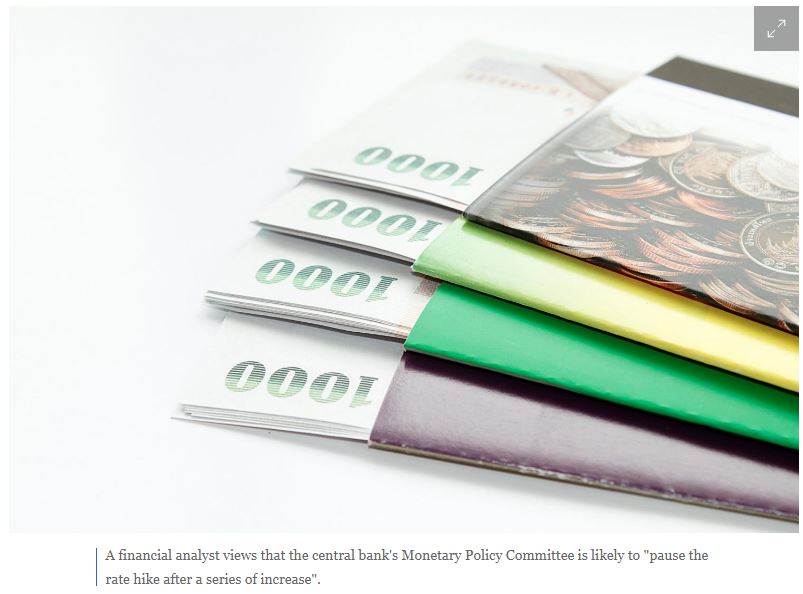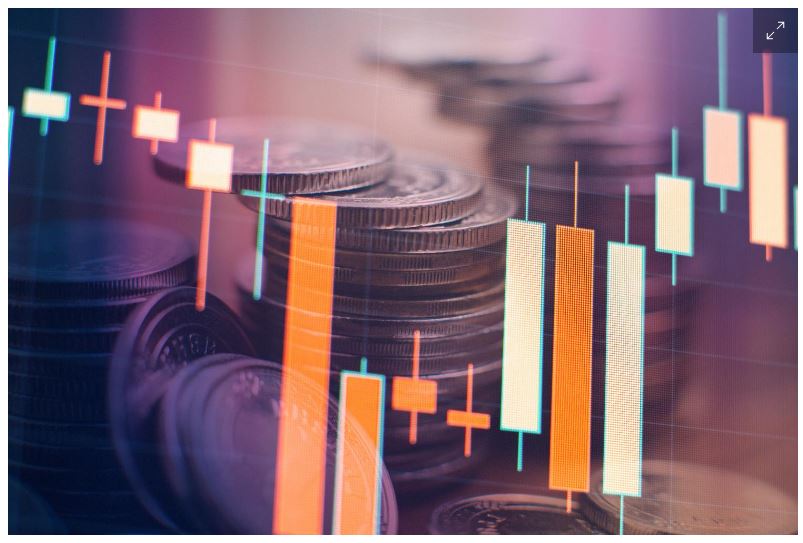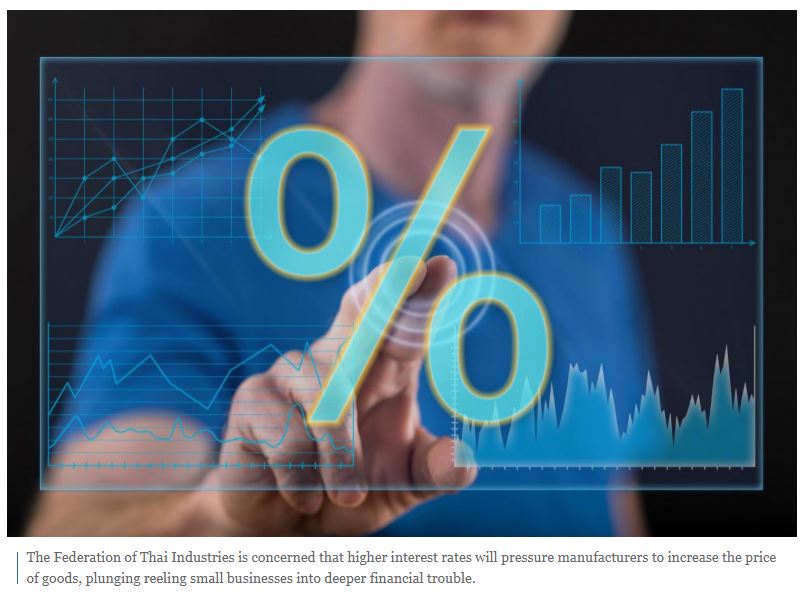Thailand: The eternal joust over rate hikes
Some industry leaders are concerned about higher interest rates affecting businesses, especially small ones, in addition to weakening the purchasing power of homebuyers.
On May 31, the Bank of Thailand’s Monetary Policy Committee (MPC) voted unanimously to raise the policy rate to 2.00% from 1.75% to curb inflation risks as the economy gathers strength. Many state and private banks followed suit by raising their interest rates.
INCREASING PRESSURE
Higher interest rates will pressure manufacturers to increase goods prices, causing distress for reeling small and medium-sized enterprises (SMEs) as they struggle to survive, said the Federation of Thai Industries (FTI).
Increased interest rates lead to greater financial costs, and along with expensive electricity bills, this can make it difficult for some companies to maintain product prices, or even to continue operations, said Kriengkrai Thiennukul, chairman of the FTI.
Manufacturers need to increase goods prices as their operating costs rise, while also reducing production, said Mr Kriengkrai.
The pricing and manufacturing factors will pressure domestic consumption, and lower consumption will eventually affect the economy, he said.
“Survival will be rough for SMEs given the interest and electricity burdens. Now include plans to increase the daily minimum wage, as suggested by the Move Forward and Pheu Thai parties, and conditions get tighter,” said Mr Kriengkrai.
“It’s not difficult to predict the future of SMEs, especially those still affected by the pandemic.”
The tourism sector has been pacing the economy as exports have slowed for seven consecutive months, he said.
As foreign arrivals tallied almost 11 million in the first five months of this year, Thailand is on track to reach at least 25 million for the year, generating 2.38 trillion baht, said Tanes Petsuwan, deputy governor for Asia and the South Pacific at the Tourism Authority of Thailand.
The agency is working on new promotional plans for the next fiscal year and expects to finalise its proposal to the new government this month.
Mr Kriengkrai suggested authorities use a variety of tools to stimulate domestic consumption.
“If the establishment of a new government is delayed, the tourism sector may be affected,” he said.
“If political problems lead to a street protest, foreign tourists will postpone their trips to Thailand.”
Visit Limlurcha, vice-chairman of the Thai Chamber of Commerce, said the central bank’s rate hikes have affected the cost of doing business, particularly for enterprises that shoulder debts.
For businesses still recovering from the pandemic impact that need to borrow additional funds to resume their operations, he said the rate hikes will be painful.
SMEs will be the most affected group because they have less financial capital than larger businesses, said Mr Visit.
Most SMEs have recently recovered from the impact of the pandemic and face trade challenges including high production costs and international conflicts, which have global economic repercussions, he said.
Further increases in interest rates are expected to significantly affect SMEs’ costs, while a rate hike could hamper the economic recovery in Thailand, said Mr Visit.
He said the Thai economy is not robust enough currently to effectively handle the increased costs resulting from higher interest rates, while campaign pledges from the proposed coalition government to raise the minimum wage could deteriorate the financial condition of SMEs when combined with costly electricity bills and fuel prices.
 STAGNANT PURCHASING POWER
STAGNANT PURCHASING POWER
An interest rate hike would significantly weaken the purchasing power of homebuyers, who are already burdened by high household debt, while housing prices are rising and the relaxed loan-to-value (LTV) borrowing limits expired, according to a property consultancy.
Vichai Viratkapan, acting director-general of the Real Estate Information Center (REIC), said interest rates have risen this year, and could gain 0.75-1.0% in 2023.
“Higher interest rates will have a strong impact on residential sales and transfers, as they limit capacity to purchase and borrow,” he said.
“The property market this year will likely be stagnant.”
If the interest rate increases by 0.75 percentage points this year, obtaining a mortgage would become more challenging for homebuyers as monthly mortgage payments rise, said Mr Vichai.
Homebuyers may be compelled to purchase a lower-priced house, he said.
Under a base-case scenario, REIC estimated a 6.8% decline in nationwide new mortgages in 2023, amounting to 651 billion baht, decreasing from 698 billion baht last year.
The REIC estimated under a worst-case scenario, with the economic slowdown persisting, new mortgages would dip by 16.1% for a value of 586 billion baht. This amount is less than the mortgage tally during the pandemic years of 2020-22.
“Since the relaxation of the LTV limits expired at the end of 2022, it has become more challenging for homebuyers to obtain mortgage approvals, as they are now required to provide a larger down payment,” said Mr Vichai.
“If interest rates increase, this situation will deteriorate.”
SME BURDEN
Marisa Sukosol Nunbhakdi, president of the Thai Hotels Association (THA), said increasing interest rates would exacerbate the cost burden for small and medium-sized hotels in particular, as most of them are in the early stages of resuming their business.
She said tourism arrivals in Thailand have gained momentum since the fourth quarter of 2022, but majority of guests stayed in the upscale and luxury segment.
Smaller hoteliers also faced difficulties accessing bank loans during the pandemic because of stagnant cash flow and a balance sheet in the red.
Mrs Marisa said these hotels just started receiving approvals for their loan applications in the past few months to refurbish or renovate their properties, thanks to the return of Asian customers, led by China.
She said rate hikes mean hoteliers would incur higher debts and monthly repayments, increasing their burden in addition to wage and electricity costs.
Some hotels that were granted soft loans during the pandemic are still unable to close their loan accounts, requiring more time to stabilise their financial status, said Mrs Marisa.
If the government wants to help small operators, she said it should consider extending the repayment period or waiving interest for a period to ease their cost burden for the short term.
Mrs Marisa said hotel operators also urged the government to consider increasing the daily minimum wage in tiers, linked to the economy in each province.
She said this option would be fairer for most small operators in secondary destinations that generate less tourism income than major cities.
LIKELY RATE PAUSE
Kampon Adireksombat, first senior vice-president and team head of SCB Chief Investment Office, believes the MPC is likely to “pause the rate hikes after a series of increases”.
“The current policy rate of 2% is already higher than the pre-Covid level and should be sufficient to mitigate inflation risks,” he told the Bangkok Post.
Headline inflation in Thailand rose 0.53% year-on-year last month, while core inflation was 1.55%, signalling that inflationary pressure is likely to ease going forward and could be in the central bank’s target range of 1-3%, said Mr Kampon.
“Despite a continued recovery in tourism and related sectors likely supporting employment and domestic purchasing power, recent global activities and Thai trade data suggest a Thai export recovery is likely to be slow,” he said.
“Moreover, political and policy uncertainty should result in an investment slowdown.”
Financial conditions have not yet proved a hindrance to private sector fundraising nor the economic recovery, said Mr Kampon. But private sector funding has slowed, mainly driven by corporate bond issuance.
On the other hand, business lending has stalled, sliding 0.3% year-on-year in the first quarter. Lending to smaller enterprises, with loan value of less than 500 million baht, shrank by 3.5% over the period, while those to larger enterprises at 500 million baht or more, grew 2% from a year earlier.
While specific details regarding the proposed new government’s economic stimulus measures remain sparse, their potential impact on the economy is expected to be less significant than previous measures. This is primarily because the public debt-to-GDP ratio is 61.2%, compared with 43.3% in 2014, leaving limited fiscal space for stimulus schemes, he said.
Household debt stands at a considerable 87% of GDP, up from 80% in 2014, further constraining lending activity in the financial sector as caution prevails, said Mr Kampon.
“The impact of minimum wage increases depend on whether they are fully implemented in one swift hike or adjusted incrementally,” he said.
“Analysis suggests previous minimum wage increases had a limited effect on inflation rates and took a reasonable amount of time to pass through to producer and consumer price indices.”
If the MPC continues to increase rates, Mr Kampon said the impact depends on the level of the uptick.
“I believe the policy rate will remain at 2% for the remainder of the year,” he said.
“If the committee does hike the rate, there is a 30% chance it would be a 0.25 percentage point increase at the next meeting on Aug 2, which should have a manageable impact.”
The MPC said earlier the real interest rate should “ideally be positive in normal economic conditions”, but Mr Kampon said the current economic situation in Thailand is not normal.
“The MPC considers the real interest rate as one of the factors in monetary policy decisions, along with growth prospects, inflation and financial system stability,” he said.
“The real interest rate in Thailand is already approaching 0%, so I think any further rate hike would be 0.25 percentage points at the most.”
 GRADUAL MOVES AFTER HIKE
GRADUAL MOVES AFTER HIKE
The trend of rising interest rates is likely over as inflation decelerates, said Rak Vorrakitpokatorn, president of the Export-Import (Exim) Bank of Thailand.
According to the latest report by the Commerce Ministry, the inflation rate in May was the lowest in 21 months, easing for a fifth consecutive month.
Mr Rak said he feels confident interest rates in Thailand have reached a threshold level.
“The good news is interest rates should not increase anytime soon,” he said.
“Many people predicted exports would contract this year, but I still expect an expansion of 1-2%.”
Mr Rak said export products likely to benefit this year include fruit, particularly durian, as well as customised products that meet global market needs, such as functional food and environmental, social and governance (ESG) products, like biodegradable packaging.
The ESG industry is forecast to average growth of 13% per year, he said.
Government Housing (GH) Bank recently raised interest rates for both deposits and loans following the central bank’s rate hike. GH Bank raised interest rates on special savings account and fixed deposit accounts by 0.05-0.35% per year, and all types of loan rates by 0.25% per year, effective from June 9, on a gradual basis.
Krit Sesawet, director and acting president of GH Bank, said the gradual loan rate hike was to ensure equal access to financial services, particularly for retail customers and vulnerable groups.
He said GH Bank’s minimum retail rate (MRR) is lower than the average rate offered by large commercial banks, an indication of its concern for vulnerable borrowers.
Though GH Bank raised loan rates, the bank has an annuity that creates a buffer of about 1% for borrowers. Borrowers at the bank typically pay a monthly rate that is a bit higher than expected based on the mortgage calculation.
As a result, when the loan interest rate is increased by 0.25%, there is no need to increase the monthly payment, said Mr Krit.
Some 400 loan accounts out of a total of 3 million require debt restructuring to reduce the burden on the annuity, he said.
HOUSING MARKET EFFECTS
The higher interest rates should impact mortgage demand, while growth for loan products will likely be flat or contract this year, said Bank of Ayudhya (Krungsri) executive vice-president Nathapol Luepromchai.
If the central bank maintains its rate at 2% this year, the banking industry is projected to have flat mortgage growth, he said.
If the rate hikes continue, exceeding 2%, the industry’s mortgages would contract in 2023, said Mr Nathapol.
Rising interest rates affect new housing loan demand as homebuyers have low purchasing power because inflation is pushing up living costs, he said.
As a result, some potential homebuyers may delay their purchases for 1-2 years, awaiting better conditions, said Mr Nathapol.
Some research houses predict the MPC will raise its policy rate one or two more times this year to 2.25-2.5% by the third quarter, in an effort to curb inflation.
The MPC said its last rate hike aligns with the Thai economic expansion, driven mainly by tourism and improving domestic consumption.
The central bank raised the policy rate six consecutive times from August 2022, rising from 0.5% to 2%.
FOLLOW THE LEADER
Commercial banks have moved in unison after central bank hikes, increasing both prime deposit and loan interest rates across the board.
The country’s six largest banks, which are deemed domestic systemically important banks by the Bank of Thailand, have increased prime loan rates, including the minimum loan rate (MLR), minimum overdraft rate (MOR) and MRR by 0.2%.
The MLR of these large banks is between 6.8-7.275% per year, while the MOR is 7.13-7.4% and the MRR is 7.05-7.38%.
The savings account interest rates for these large banks is between 0.125-0.6%.
Mr Nathapol said banks normally offer mortgages that charge the MRR. For every 1% rate increase in the MRR, the monthly instalment payment would rise by 800 baht for every 1 million baht loaned.
For example, if a homebuyer borrows 1 million baht from a bank and is required to pay 7,000 baht per month, an MRR increase of 1% means the monthly payment would increase to 7,800 baht.
In this scenario, some potential homebuyers may delay a purchase, limiting mortgage growth, he said.
In addition to waning loan demand, a high base effect last year should also dampen mortgage growth in 2023, said Mr Nathapol.
The banking sector posted strong new mortgage growth last year of 14%, tallying 697 billion baht, rising from 612 billion the year before, he said.
Property developers and banks may implement promotional campaigns to drive sales in the second half this year, said Mr Nathapol.
Developers could also demand the central bank resume the relaxation of LTV limits for mortgages to support the sector, domestic consumption and economic growth, he said.
Krungsri is not concerned about higher non-performing loans (NPLs) for mortgages given the bank’s preemptive measures and special deposit-linked mortgage packages to handle rising interest rates, said Mr Nathapol.
BANK MEASURES
Thakorn Piyapan, president of TMBThanachart Bank, said the bank has offered some mortgage customers the option to increase the monthly debt repayment amount or extend the loan period to ease the higher monthly debt burden as interest rates rise.
“The bank offered 0.5% of its customers, those who are likely to generate bad debt in the future, the option to increase the debt payment amount per month or extend the term of the mortgage,” said Mr Thakorn.
“These measures would ease the financial burden of customers and help the bank to maintain good loan quality.”
Payong Srivanich, chairman of the Thai Bankers’ Association (TBA), said rising interest rates would affect consumer loan products, in particular mortgages and auto loans rather than SME loans.
As inflation drives up the cost of living, demand for housing and auto loans has been declining, said Mr Payong.
The TBA believes existing mortgage customers are capable of repaying debt, both principal and interest, he said.
Some SME businesses are vulnerable and rising interest rates as well as persistent inflation will ratchet up both operational and financial costs, said Mr Payong.
Banks are monitoring this segment and stand prepared to offer them financial assistance, including debt restructuring schemes, he said.
Banks will help both commercial and individual customers that have weak debt payment ability through the central bank’s long-term debt restructuring programme and other measures in line with the client’s requirements, said Mr Payong.
Supporting customers’ ability to handle debt payments also helps banks to contain NPLs, he said.
Source: https://www.bangkokpost.com/business/2590070/the-eternal-joust-over-rate-hikes


 Thailand
Thailand




